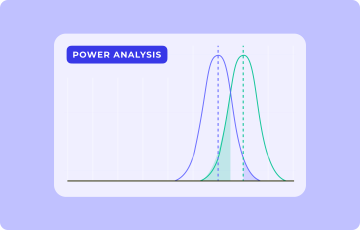
Why Airtable falls short as an experimentation management system
Experimentation is key to innovation, but the right tools are crucial for your team's success in executing, analyzing, and iterating efficiently. While Airtable and Google Spreadsheets are popular for their flexibility and ease of use, these tools fall short in managing complex experimentation workflows.
Here are five reasons why these tools fall short as experiment management systems, and how integrating Kameleoon with Effective Experiments offers a superior alternative.
5 ways Airtable falls short as an experimentation management system
1. Lack of comprehensive workflow
Airtable and Google Spreadsheets are fine for basic data entry and task management, but they don't support a robust experimentation process. This lack of ability to integrate workflows leads to disjointed processes - making effective management a messier process.
When integrated with Kameleoon, Effective Experiments syncs ideation, planning, execution, and analysis together. This ensures data integrity and visibility throughout all experiment stages, which these other tools can't do out of the box.
2. Inadequate support for experimentation best practices
Tools like Airtable and Google Spreadsheets can be overly flexible, leading to a lack of standardization and oversight. These conditions can result in inconsistent experiment quality - a true nightmare for management tasks.
Functional experimentation requires adherence to best practices like hypothesis formulation, prioritization models, and rigorous planning. Effective Experiments enforces these practices with built-in frameworks and customizable templates, ensuring each experiment is well-documented and methodologically sound.
3. Limited real-time visibility and collaboration
Airtable, Google Spreadsheets, and similar tools can lead to siloed workflows. Under these conditions, experiments are documented, but not effectively shared or collaborated on.
Effective Experiments, meanwhile, is designed to enable collaboration and visibility across your entire organization. With features like shared links, real-time updates, and detailed dashboards, stakeholders can easily stay informed on and engaged with the experimentation process without requiring access to multiple systems.
4. Scalability issues for more complex setups
As experimentation programs grow, the limitations of Airtable and Google Spreadsheets become more pronounced. Managing multiple experiments across various teams requires a system that can handle complex workflows and data at-scale.
Effective Experiments grows with your program, offering robust analytics, automated reporting, and integration with tools like Kameleoon to effortlessly manage large volumes of data and insights.
5. Inefficient data management and reporting
Airtable and Google Spreadsheets struggle with managing and reporting experimental data. This lack of backend organization makes data visualizations difficult. In other words: Your CEO will never look at Airtable or a Google Spreadsheet.
Effective Experiments offers an integrated platform that stores, analyzes, and visualizes data. This includes automated reporting, health scores for experiment quality, and the ability to track the implementation and impact of experiments.
How Effective Experiments encourages healthy experimentation habits
Effective Experiments helps your team build healthy experimentation habits. The solution guides users through a structured workflow, ensuring each experiment is well-planned, prioritized, and documented.
This systematic approach improves experiment quality and fosters a culture of continuous improvement and learning with:
- Standardized processes. Effective Experiments enforces a standardized approach to experimentation, ensuring consistency and quality across all teams.
- Training and support. The platform provides training materials and support to help teams adopt best practices in experimentation.
- Feedback and iteration. With built-in feedback loops and the ability to analyze past experiments, teams can learn from their successes and failures, refining their methods over time.
- Collaboration tools. Features designed to enhance communication and collaboration ensure that everyone is on the same page and can contribute to the experimentation process.
- Comprehensive documentation. By maintaining detailed records of every experiment, Effective Experiments helps teams build a knowledge base that can inform future experiments and decisions.
Effective Experiments transforms experimentation from a series of isolated tasks into a cohesive, well-managed process that drives better outcomes and fosters a culture of innovation.
Learn more about Kameleoon's integration with Effective Experiments.
Experimentation is key to innovation, but the right tools are crucial for your team's success in executing, analyzing, and iterating efficiently. While Airtable and Google Spreadsheets are popular for their flexibility and ease of use, these tools fall short in managing complex experimentation workflows.
Here are five reasons why these tools fall short as experiment management systems, and how integrating Kameleoon with Effective Experiments offers a superior alternative.
5 ways Airtable falls short as an experimentation management system
1. Lack of comprehensive workflow
Airtable and Google Spreadsheets are fine for basic data entry and task management, but they don't support a robust experimentation process. This lack of ability to integrate workflows leads to disjointed processes - making effective management a messier process.
When integrated with Kameleoon, Effective Experiments syncs ideation, planning, execution, and analysis together. This ensures data integrity and visibility throughout all experiment stages, which these other tools can't do out of the box.
2. Inadequate support for experimentation best practices
Tools like Airtable and Google Spreadsheets can be overly flexible, leading to a lack of standardization and oversight. These conditions can result in inconsistent experiment quality - a true nightmare for management tasks.
Functional experimentation requires adherence to best practices like hypothesis formulation, prioritization models, and rigorous planning. Effective Experiments enforces these practices with built-in frameworks and customizable templates, ensuring each experiment is well-documented and methodologically sound.
3. Limited real-time visibility and Native Integration
Airtable, Google Spreadsheets, and similar tools can lead to siloed workflows. Under these conditions, experiments are documented, but not effectively shared or collaborated on.
Effective Experiments, meanwhile, is designed to enable collaboration and visibility across your entire organization. With features like shared links, real-time updates, and detailed dashboards, stakeholders can easily stay informed on and engaged with the experimentation process without requiring access to multiple systems.
4. Scalability issues for more complex setups
As experimentation programs grow, the limitations of Airtable and Google Spreadsheets become more pronounced. Managing multiple experiments across various teams requires a system that can handle complex workflows and data at-scale.
Effective Experiments grows with your program, offering robust analytics, automated reporting, and integration with tools like Kameleoon to effortlessly manage large volumes of data and insights.
5. Inefficient data management and reporting
Airtable and Google Spreadsheets struggle with managing and reporting experimental data. This lack of backend organization makes data visualizations difficult. In other words: Your CEO will never look at Airtable or a Google Spreadsheet.
Effective Experiments offers an integrated platform that stores, analyzes, and visualizes data. This includes automated reporting, health scores for experiment quality, and the ability to track the implementation and impact of experiments.
How Effective Experiments encourages healthy experimentation habits
Effective Experiments helps your team build healthy experimentation habits. The solution guides users through a structured workflow, ensuring each experiment is well-planned, prioritized, and documented.
This systematic approach improves experiment quality and fosters a culture of continuous improvement and learning with:
- Standardized processes. Effective Experiments enforces a standardized approach to experimentation, ensuring consistency and quality across all teams.
- Training and support. The platform provides training materials and support to help teams adopt best practices in experimentation.
- Feedback and iteration. With built-in feedback loops and the ability to analyze past experiments, teams can learn from their successes and failures, refining their methods over time.
- Collaboration tools. Features designed to enhance communication and collaboration ensure that everyone is on the same page and can contribute to the experimentation process.
- Comprehensive documentation. By maintaining detailed records of every experiment, Effective Experiments helps teams build a knowledge base that can inform future experiments and decisions.
Effective Experiments transforms experimentation from a series of isolated tasks into a cohesive, well-managed process that drives better outcomes and fosters a culture of innovation.
Learn more about Kameleoon's integration with Effective Experiments.



